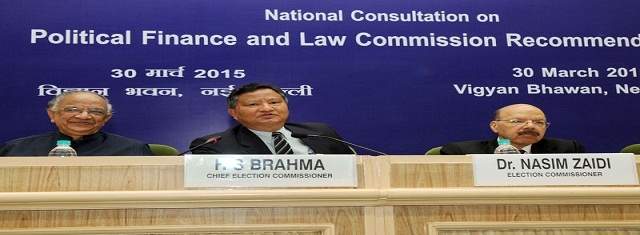News
ECI Organises National Consultation on Political Finance
Best Practices on Political Finance

Mr. HS Brahma addressing the Concluding Session. (Source: PIB/GR/TYP/BIN/USPA/WN)
USPA NEWS -
Chief Election Commissioner, Mr. HS Brahma addressing the Concluding Session of National Consultation on Political Finance & Law Commission Recommendations, organised by the Election Commission of India, in New Delhi on March 30, 2015. Election Commissioner, Dr. Syed Nasim Ahmad Zaidi is also seen.
The Election Commission of India (ECI) organized a National Consultation on "Political Finance and Law Commission Recommendations" at Vigyan Bhawan on March 30.
This consultation had been initiated on the backdrop of the 255th Report of the Law Commission which had been presented on the March 12, 2015, making various recommendations for electoral reforms in the country.
This consultation had been initiated on the backdrop of the 255th Report of the Law Commission which had been presented on the March 12, 2015, making various recommendations for electoral reforms in the country.
The seminar was attended by Justice A. P. Shah, Chairman, Law Commission, Former Chief Election Commissioners Mr. Lyngdoh, Mr. Krishnamurthy, Mr. Gopalaswami, Mr. Chawla and Mr. Quraishi, Mr. Satyanand Mishra, Former Chief Information Commissioner, Mr. SS Khan, Former Member, CBDT, and other distinguished guests comprising of representatives of political parties, eminent lawyers, academicians, Media representatives, Civil Society representatives and student representatives.
The session was started with welcome message by Mr. PK Dash, Director General, ECI, opening remarks by Dr. Nasim Zaidi, Election Commissioner and address by Mr. HS Brahma, Chief Election Commissioner. Justice A. P. Shah, Chairman, Law Commission addressed the general session giving brief overview of the Law Commission recommendations on Political Finance.
This was followed by Technical Sessions on four different topics, International Best Practices on Political Finance, Law Commission recommendations and expanding in-kind Government subsidy during election campaign, recommendations on contribution to political parties and candidates and Law Commission recommendations and reforms on accounting and disclosure of election expenses by parties, candidates and 3rd party campaigners and reforms on vote buying.
The topics were discussed and deliberated in great detail by the participants in their respective groups. The groups made presentations summarizing their views on the topics deliberated by them.
Finally, the day long National Consultation was concluded with a valedictory address by the Chief Election Commissioner Mr. HS Brahma and Dr. Nasim Zaidi, Election Commissioner.
The consultation groups made important observations and gave their considered opinion on various aspects of political finance in India and recommendations made by the Law Commission in its 255th Report.
Finally, the day long National Consultation was concluded with a valedictory address by the Chief Election Commissioner Mr. HS Brahma and Dr. Nasim Zaidi, Election Commissioner.
The consultation groups made important observations and gave their considered opinion on various aspects of political finance in India and recommendations made by the Law Commission in its 255th Report.
There was broad consensus on “˜Big Money´ in election to be controlled, Vote buying to be controlled within law, Transparency of accounts of parties / candidates, No corporate donation to political party, National Electoral Trust under the control of Election Commission for corporate donations, ECI to be given power to make rules, Third party campaigners to be monitored, Fast Track Courts to try election offences.
The detailed report on National Consultation will be compiled and will be made available on the Commission´s Website.
The detailed report on National Consultation will be compiled and will be made available on the Commission´s Website.
Doruvu Paul Jagan Babu New Delhi Election Commission Of India Hs Bramha Political Finance Recommendations Law Commission
Liability for this article lies with the author, who also holds the copyright. Editorial content from USPA may be quoted on other websites as long as the quote comprises no more than 5% of the entire text, is marked as such and the source is named (via hyperlink).





